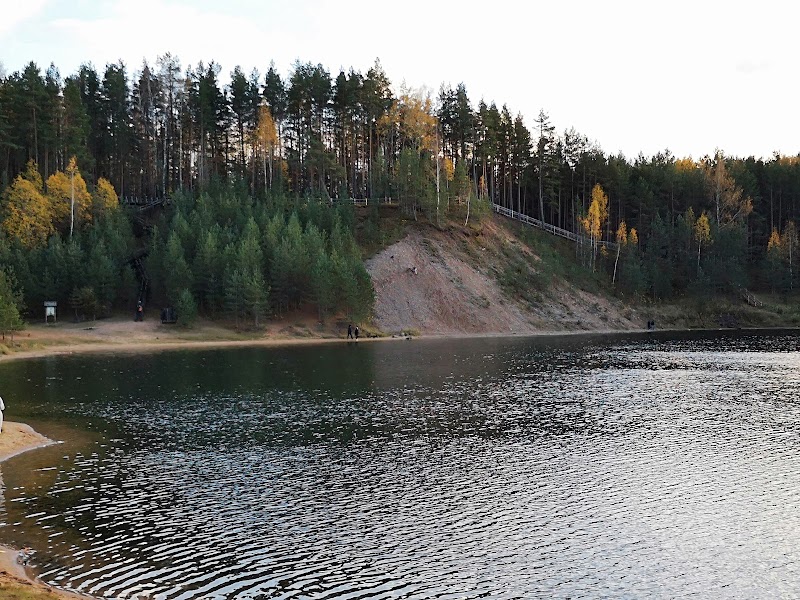
Ogre City Days: A Dynamic Celebration of Culture and Outdoors in Latvia
Annual Ogre City Days in Ogre, Latvia, invites visitors to experience vibrant local culture intertwined with invigorating outdoor activities along scenic river trails. Perfect for adventurers and culture enthusiasts alike, this festival offers practical chances to explore nature and heritage in equal measure.
Choose sturdy footwear
Trails can become slippery from river spray and occasional June rain; shoes with good traction provide stability whether walking forest paths or riverbanks.
Stay hydrated throughout your hike
Carry at least 1 liter of water, as some longer routes have limited access to drinking stations, especially on quieter trail sections.
Plan hikes for morning or late afternoon
Temperatures are cooler, wildlife is more active, and light quality is better for photography during these times.
Bring insect repellent
Forest and riverside areas attract mosquitoes and ticks especially in early summer; proper protection protects your comfort and health.
Ogre City Days: A Dynamic Celebration of Culture and Outdoors in Latvia
Every summer, the town of Ogre in Latvia transforms into a hub of spirited festivities with the Annual Ogre City Days. This event offers a refreshing blend of cultural vibrancy and outdoor engagement, making it an attractive destination for adventurers and families alike. Spanning three days, typically in early June, Ogre City Days invites visitors to experience local crafts, music, and food alongside invigorating outdoor activities that take full advantage of the region’s natural landscape.
Ogre is cradled by the Daugava River, whose waters challenge kayakers and beckon anglers, while the surrounding forested trails cut through gentle hills and dense greenery. The terrain is accessible enough for casual strolls yet varied enough to satisfy more seasoned explorers looking for quick bursts of wildlife and panoramic views. Expect routes averaging 5 to 10 kilometers with modest elevation changes, ideal for a half-day expedition.
The festival’s program exceeds mere sightseeing. It coordinates guided hikes that wind along the river’s edge, where currents dare you to pause and reflect, and the undergrowth responds with the chorus of songbirds. Local artisans display their works in open-air markets, and music stages pulse with rhythms that echo off ancient trees, giving the forest an unmistakable personality—engaged and aware.
Practical preparation is key for a seamless experience. The early summer weather can be unpredictable; layers adaptable to rain and sun are wise. Footwear should balance grip and comfort to handle damp paths with occasional muddy stretches. Hydration stations are common at festival hubs, but carrying a water bottle is recommended when venturing into less populated trails. Timing your visits to morning or late afternoon hikes avoids the midday heat and enhances chances to spot deer or hear owls stirring.
Ogre City Days balances the thrill of discovery with a respectful nod to nature’s demands. Whether it’s the steady incline that tests your legs or the riverbanks that whisper stories of centuries past, this event invites you to engage with a place that remains fiercely itself. This is not just a festival; it’s a practical adventure where culture and landscape come together, offering insights and excitement for all who attend.
Nearby Trips
All Adventures
Boat Charters
Water Activities
Adventures near Ogre, Latvia
Discover the unique and memorable adventures that make Ogre, Latvia special.
Frequently Asked Questions
What is the best way to reach Ogre for the City Days festival?
Ogre is easily accessible by train or car from Riga, Latvia’s capital, with a journey taking about 40 minutes. Train services are frequent and convenient for visitors planning day trips or longer stays.
Are there guided hiking tours during Ogre City Days?
Yes, local guides lead hikes along the Ogre River and nearby forest trails, combining cultural storytelling with nature observations. Booking in advance is advised during the festival weekend.
What wildlife might I encounter on hikes in Ogre?
Expect to see common Latvian wildlife like roe deer, various songbirds, and occasionally beavers near the riverbanks. Keep an eye out at dawn and dusk when animals are most active.
Is camping allowed during the festival?
While there are designated campgrounds around Ogre, camping within festival zones is restricted. Nearby campsites offer facilities, but lodging in town is popular during the event.
Are there any environmental rules to follow during hikes?
Visitors are encouraged to stay on marked trails, carry out all waste, and avoid disturbing wildlife. The organizers promote Leave No Trace principles to protect the area’s natural integrity.
What unique cultural events take place during Ogre City Days?
Traditional Latvian folk music, craft workshops, and regional food tastings highlight the event. Evening concerts often feature well-known Latvian bands alongside local performers.
Recommended Gear
Waterproof hiking boots
Keeps feet dry and provides grip on wet and varied terrain during spring rains and damp conditions.
Layered clothing
Adapt layers as temperature shifts from morning chill to warmer afternoons during summer hikes.
Insect repellent
Repels mosquitoes and ticks common around forest and river areas during Ogre City Days festival time.
Hydration pack or water bottle
Maintains hydration over multi-hour excursions where water points may be limited.
Local Insights
Hidden Gems
- "The small wooden bridge over the Ogre River offers a quiet vantage point for reflection and photos away from main festival crowds."
- "Lielupe Lake to the east provides serene kayaking routes often overlooked by visitors focusing on festival zones."
Wildlife
- "roe deer"
- "beavers"
- "woodpeckers"
- "common buzzards"
History
"Ogre’s history as a riverside settlement dates to the 17th century, with its name derived from the Ojārs River. The festival celebrates both this heritage and the town’s evolution into a regional cultural center."
